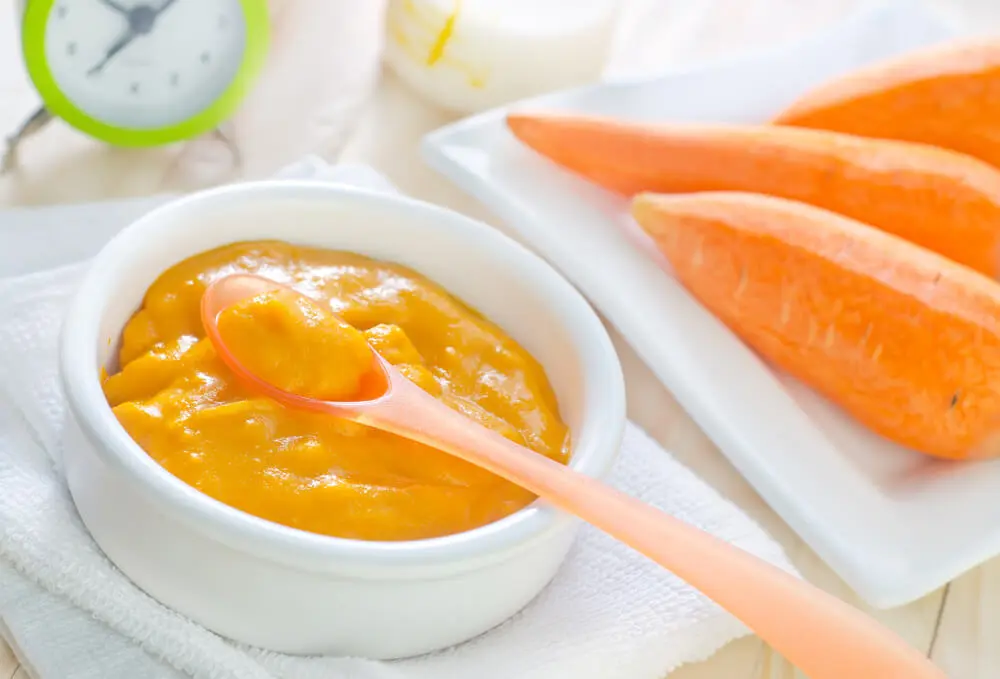Share This Article
Has your little one reached 6 months of age and is he ready to start complementary foods for breast milk (MPASI)? Moms must have chosen several recipes so that your child’s food is more varied, right? Don’t forget to include carrots in the food list, Moms. Because carrots are a food choice that contains the nutrients needed for babies. The following is an explanation of the nutritional content of carrots and their benefits for your little one. As well as some tips for processing carrots for baby MPASI.
Carrot nutritional content

In 100 grams of carrots contains:
- Calories: 41
- Fiber: 2.8 grams
- Carbohydrates: 9.58 grams
- Protein: 0.93 milligrams
- Fat: 0.24 milligrams
- Calcium: 33 milligrams
- Iron: 0.3 milligrams
- Magnesium: 12 milligrams
- Phosphorus: 35 milligrams
- Potassium: 320 milligrams
- Sodium: 69 milligrams
- Vitamin C: 5.9 milligrams
- Vitamin B1: 0.066 milligrams
- Manganese: 0.143 milligrams
- Vitamin B2: 0.058 milligrams
- Vitamin B3: 0.983 milligrams
- Zinc: 0.24 milligrams
- Vitamin B5 0.273 milligrams
- Vitamin A: 0.835 milligrams
Apart from those already mentioned, it also contains small amounts of vitamins B6, B9, E and K. With this content, including carrots as part of baby food can provide a number of benefits for children’s health.
Benefits of carrots for babies
Moms, when your child has entered the time to eat solid food, carrots are one of the foods that you choose. Because in the early days of babies trying solid food, Moms need to get your little one used to the new tastes of foods other than breast milk.
Carrots naturally have a sweet and mild taste after cooking. So it is suitable for children who are just learning to know various taste choices. Moreover, the nutritional content of carrots is needed for baby’s health, because it can provide a number of benefits such as the following.
1. Supports healthy cell growth
Carrots contain properties that affect cell growth mechanisms. If faster cell growth is needed, such as healing wounds, the nutrients from carrots can help with this healing.
2. Better liver function
The liver is an organ that is affected when toxic chemicals enter the body. Carrots are useful for protecting the liver from the effects of these dangerous chemicals.
3. Strengthens the body’s immunity
Babies need a strong immune system. Lymphocytes and blood platelets are two things that maintain the balance of the immune system. Carrots help increase the amount of both so that the child’s immune system becomes stronger.
4. Supports heart health
The flavonoid content can improve heart and kidney health, making these organs function better. So the blood circulation system is also smoother.
5. Good for eyesight
Carrots are good for eye health, especially the retina, eye lining and cornea. Reporting from Healthline, babies under six months need 400 micrograms of vitamin A per day and babies aged between 6 months and one year need 500 micrograms per day.
Other benefits of carrots
Other carrot content, such as vitamin K, can help blood clot properly. Vitamin B6, necessary for healthy skin, hair, eyes and liver.
Meanwhile, the fiber content of carrots is good for supporting digestive health.
Tips for cooking carrots for babies
New babies can eat carrots after they are 6 months old. For the early ages, Moms should serve carrots that have been cooked and processed to make them easier to eat. Here are some tips for processing carrots for your little one.
– Boiled carrots
This is an easy method, because you just peel and wash the carrots. Then boil it in water until soft. Once cooked, mash it and add water to get the right consistency.
– Roasted carrots
Roasted vegetables will bring out a stronger flavor. The way to roast carrots is to peel and wash them. Then cut into pieces and pour a spoonful of olive oil in a container.
Flatten and bake the carrots for 30 minutes in the oven at around 140 degrees Celsius. Once cooked, blend the roasted carrots and one glass of water until smooth.
– Mixing carrots with chicken
Setting up this menu is quite easy. Moms need to heat olive oil in a pan to sauté half an onion until soft. Add 350 grams of sliced carrots and 250 milliliters of chicken stock and bring to a boil.
Add one chopped chicken breast and cook until cooked. After that, blend everything into a dish that meets the daily nutritional needs of babies aged 7 to 12 months.
Moms can also mix carrots with other vegetables or make them into carrot meatballs to train your baby’s ability to grasp his own food.
These are the benefits and also a few tips for Moms who want to use carrots as an ingredient in complementary foods for breast milk for their little ones.
Have further questions? Please chat directly with our doctor for a consultation. Our doctor partners are ready to provide solutions. Come on, download the Good Doctor application click here!


